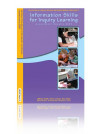In 2009, the third year of the fourth cycle of national monitoring, three areas were assessed: mathematics, social studies and information skills. This report presents details and results of the assessments of information skills.
New Zealand’s National Education Monitoring Project commenced in 1993, with the task of assessing and reporting on the achievement of New Zealand primary school children in all areas of the school curriculum. Children are assessed at two class levels: year 4 (halfway through primary education) and year 8 (at the end of primary education). Different curriculum areas and skills are assessed each year, over a four-year cycle. The main goal of national monitoring is to provide detailed information about what children know, think and can do, so that patterns of performance can be recognised, successes celebrated, and desirable changes to educational practices and resources identified and implemented.
Each year, random samples of children are selected nationally, then assessed in their own schools by teachers specially seconded and trained for this work. Task instructions are given orally by teachers, through video presentations, on laptop computers, or in writing. Many of the assessment tasks involve the children in the use of equipment and materials. Their responses are presented orally, by demonstration, in writing, in computer files, or through other physical products. Many of the responses are recorded on videotape for subsequent analysis.
Key Results
In the age of information, understanding the information skills of New Zealand’s schoolchildren has never been more important. The salience of technology, both its positive and negative aspects could not be better exemplified than by noting that in the 2009 administration of the Information Skills Survey, 96% of year 8 children report that when they need to find information, they go to the internet. This figure is twice as high as the next most popular response, going to a parent.
Although children are eager users of information, they are not always adept users, or savvy users. Students are fairly good, particularly at year 8, at finding and using basic information, but not as good at judging the merits of that information, comparing multiple sources of information, or organising and employing information to buttress arguments. At year 4, students have difficulty in determining what their information needs are, although there is substantial growth in this ability from year 4 to year 8. Overall we see a general pattern of skill development in all areas from year 4 to year 8 in terms of information skills.
There are some gains seen in performance overall from the 2005 administration of information skills. Girls slightly outperform boys, and Pakeha children outperform Māori and Pasifika children. The socio-economic status of the school (as indicated by its decile level) continues to be the strongest determinant of performance in information skills. Other school level variables have little impact on overall performance.

